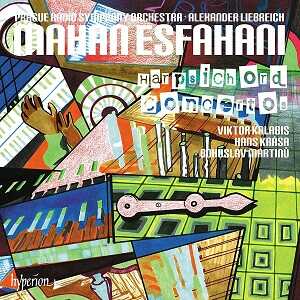
Bohuslav Martinů (1890-1959)
Concerto for harpsichord and small orchestra H246 (1935)
Hans Krása (1899-1944)
Kammermusik for harpsichord and seven instruments (1936)
Viktor Kalabis (1923-2006)
Concerto for harpsichord and string orchestra, Op.42 (1975)
Mahan Esfahani (harpsichord)
Prague Radio Symphony Orchestra/Alexander Liebreich
rec. 2021, Studio S1, Czech Radio, Prague
Hyperion CDA68397 [60]
To supplement the Martinů and Kalabis concertos, Mahan Esfahani has added Krása’s Kammermusik to form a three-course Czech harpsichord meal, teaming with the Prague Radio Symphony under their incisive, rhythmically taut conductor Alexander Liebreich. Despite his seeming near-ubiquity on British airwaves, Esfahani now lives in Prague, so this is home-town repertoire.
Martinů’s Concerto was composed in 1935 in Paris and Esfahani and Liebreich turn in a scintillating performance. Rhythmic definition is one feature, and the clarity of the orchestration is another. Cast for a ‘small orchestra’, Martinů calls for only 6 strings, a flute – splendidly prominent in the ensemble and played by Mario Mesany – bassoon and piano, which, in a piece of luxury casting, is played by Ivo Kahanék. The result in this performance is pellucid and precise, a fine recorded balance ensuring that each facet of the instrumentation is respected. In the central movement the music is sonorous and a real sense of expressive warmth is generated whilst in the finale the angularity of the themes generates a fizzing cadential passage for the harpsichord and an exuberant close. One of Esfahani’s mentors, Zuzana Růžičková, wife of Viktor Kalabis, recorded this concerto multiply most famously perhaps with Václav Neumann in 1987 on Supraphon where the conductor encouraged an even faster tempo in the second movement than Liebreich. There aren’t many tempo variations in her recordings with Zdeněk Košler and Kurt Sanderling but they’re both steadier in the opening movement.
Naturally Růžičková’s recording of her husband’s concerto looms large in the Kalabis discography and was recorded in 1980: it’s available in a Kalabis box. Esfahani and Liebreich allow themselves a little more time in the opening movement, savouring its moments of intensity in what is clearly a very personal reading. A recent competing version from Jory Vinikour, which I much admired (review), splits the difference between Esfahani and Růžičková, keeping the music propulsive whilst not stinting its sudden depths. What’s so distinctive about Esfahani’s performance is his ability to weave together the narrative – something he does unfailingly well in the slow movement, where he may not be as searing as the dedicatee but maintains the rhetorical narrative expertly. Similarly in the finale a fast tempo is taken but the contrastive slowing down brings with it a reflective intimacy that perhaps felt too personal for Kalabis and Růžičková to adopt in their recording. It’s notable that Esfahani once again – despite the Allegro vivo indication – allows the finale its full measure and is slower than his competitors.
Krása’s 14-minute Kammermusik of 1935 is cast in two movements. The septet includes cello and double bass and then three clarinets (including E flat and bass clarinet), alto saxophone and trumpet. It vests the music with a crisp, functional almost impatient Hindemith-like appeal. There are big soloistic moments and elements of fanfare or preening legato in a constant play of sonority. The second movement (of two) is based on one of Krasa’s own popular songs and starts with laidback easeful insouciance before encouraging some strikingly clever writing for the harpsichord and for combinations of instruments. It’s a succinct work, memorably played.
Crisply recorded, this is a most attractive disc – thoughtful, trim, tensile and brilliantly communicative. I could have done without Esfahani’s booklet note with its diatribe dissing an unnamed Southern hemispheric music critic – more about the music, perhaps, less about grievances – but in all other respects this disc is a winner.
Jonathan Woolf
Help us financially by purchasing from




















